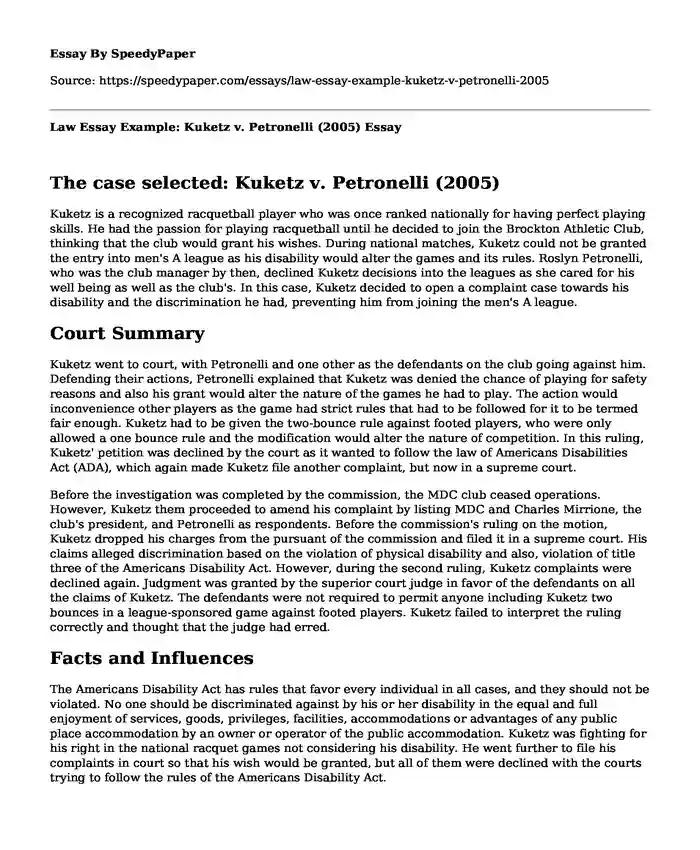The case selected: Kuketz v. Petronelli (2005)
Kuketz is a recognized racquetball player who was once ranked nationally for having perfect playing skills. He had the passion for playing racquetball until he decided to join the Brockton Athletic Club, thinking that the club would grant his wishes. During national matches, Kuketz could not be granted the entry into men's A league as his disability would alter the games and its rules. Roslyn Petronelli, who was the club manager by then, declined Kuketz decisions into the leagues as she cared for his well being as well as the club's. In this case, Kuketz decided to open a complaint case towards his disability and the discrimination he had, preventing him from joining the men's A league.
Court Summary
Kuketz went to court, with Petronelli and one other as the defendants on the club going against him. Defending their actions, Petronelli explained that Kuketz was denied the chance of playing for safety reasons and also his grant would alter the nature of the games he had to play. The action would inconvenience other players as the game had strict rules that had to be followed for it to be termed fair enough. Kuketz had to be given the two-bounce rule against footed players, who were only allowed a one bounce rule and the modification would alter the nature of competition. In this ruling, Kuketz' petition was declined by the court as it wanted to follow the law of Americans Disabilities Act (ADA), which again made Kuketz file another complaint, but now in a supreme court.
Before the investigation was completed by the commission, the MDC club ceased operations. However, Kuketz them proceeded to amend his complaint by listing MDC and Charles Mirrione, the club's president, and Petronelli as respondents. Before the commission's ruling on the motion, Kuketz dropped his charges from the pursuant of the commission and filed it in a supreme court. His claims alleged discrimination based on the violation of physical disability and also, violation of title three of the Americans Disability Act. However, during the second ruling, Kuketz complaints were declined again. Judgment was granted by the superior court judge in favor of the defendants on all the claims of Kuketz. The defendants were not required to permit anyone including Kuketz two bounces in a league-sponsored game against footed players. Kuketz failed to interpret the ruling correctly and thought that the judge had erred.
Facts and Influences
The Americans Disability Act has rules that favor every individual in all cases, and they should not be violated. No one should be discriminated against by his or her disability in the equal and full enjoyment of services, goods, privileges, facilities, accommodations or advantages of any public place accommodation by an owner or operator of the public accommodation. Kuketz was fighting for his right in the national racquet games not considering his disability. He went further to file his complaints in court so that his wish would be granted, but all of them were declined with the courts trying to follow the rules of the Americans Disability Act.
Also, all the statutes that Kuketz confronted defined discrimination to include: when reasonable modifications fail to be met in policies, procedures or practices, or when modifications are necessary to afford the required services, goods, privileges, facilities or advantages to the disabled, they (people with disabilities) should be considered unless there is a demonstration that the entity would alter the nature of the actions. Three inquiries are contemplated by the United States Supreme Court as noted by title III of the ADA. These are: whether the modification that is requested is reasonable, whether the request would alter the nature of the competition and whether the request is necessary for the person with disabilities. In the three inquiries, each varies from case to case for there seems to be no priority that is necessary among them.
Analysis
All the courts that Kuketz confronted applied fair judgment. In the matter of law, the rulings were correct as no game should be altered with one's disability. People with disabilities are often given special treatment that is in line with their state. He was given choices by Petronelli, that is, to join a racquet team with the low-level league which was under the one bounce rule or joins the wheelchair league where he would be assisted in the organization. Kuketz thought he was fit to play with the footed players, but in a real sense, he was not. Games must be fair, and their nature must not be altered regardless of gender or state. Petronelli did not make decisions by herself but discussed Kuketz situation with the team members where they weighed all the advantages and disadvantages of recruiting him or not. Petronelli had in mind that defendants are not allowed to permit people with disabilities two bounces in a league-sponsored game against the footed players. Nonetheless, the Americans Disability Act was enforced to provide a comprehensive and clear national mandate of eliminating discrimination against the disabled. Less skilled players can be trained and made perfect but not the people with disabilities because they cannot change the aspect in which games are played.
Cite this page
Law Essay Example: Kuketz v. Petronelli (2005). (2022, Jul 29). Retrieved from https://speedypaper.com/essays/law-essay-example-kuketz-v-petronelli-2005
Request Removal
If you are the original author of this essay and no longer wish to have it published on the SpeedyPaper website, please click below to request its removal:
- Attention Deficit Hyperactivity Disorder Research Paper
- Health Care Essay Example
- Free Essay on Crime Scene Investigation Procedures
- Computer Vs Information Literacy in Healthcare, Essay Example
- Test Answers Example on Freud's Psychosexual Theory and Erikson's Psychosocial Developmental
- Free Essay on Features of Equal Employment Laws
- Paper Example. The Three Escape Mechanisms
Popular categories





